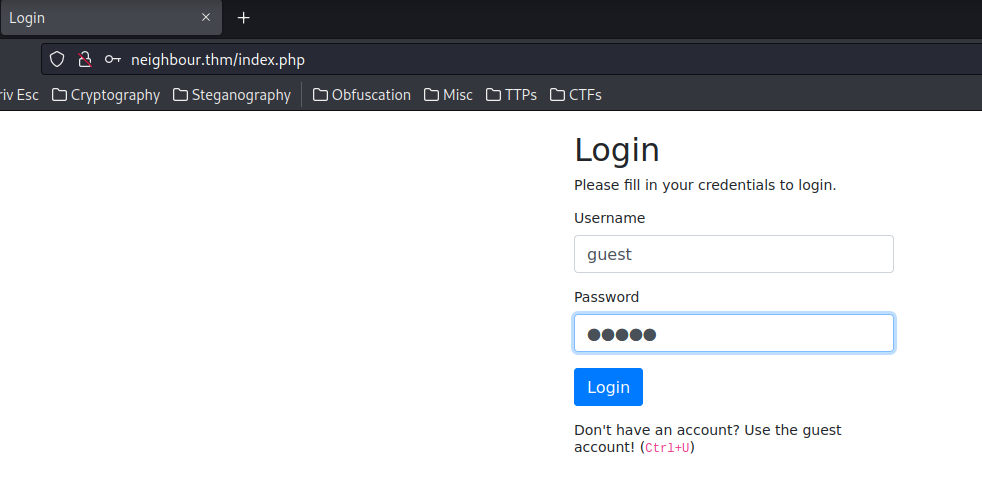Neighbour | Nov 15, 2022
Introduction
Welcome to my another writeup! In this TryHackMe Neighbour room, you'll learn: IDOR (Insecure Direct Object References)! Without further ado, let's dive in.
- Overall difficulty for me (From 1-10 stars): ★☆☆☆☆☆☆☆☆☆
Background
Check out our new cloud service, Authentication Anywhere – log in from anywhere you would like! Users can enter their username and password, for a totally secure login process! You definitely wouldn't be able to find any secrets that other people have in their profile, right?
Check out our new cloud service, Authentication Anywhere. Can you find other user's secrets?
Difficulty: Easy
Service Enumeration
As usual, scan the machine for open ports via rustscan!
Rustscan:
┌──(root🌸siunam)-[~/ctf/thm/ctf/Neighbour]
└─# export RHOSTS=10.10.235.95
┌──(root🌸siunam)-[~/ctf/thm/ctf/Neighbour]
└─# rustscan --ulimit 5000 --range 1-65535 $RHOSTS -- -sC -sV -oN rustscan/rustscan.txt
[...]
PORT STATE SERVICE REASON VERSION
22/tcp open ssh syn-ack ttl 63 OpenSSH 8.2p1 Ubuntu 4ubuntu0.5 (Ubuntu Linux; protocol 2.0)
| ssh-hostkey:
| 3072 66dcb6bd39ff852f979d25192c8c6090 (RSA)
| ssh-rsa AAAAB3NzaC1yc2EAAAADAQABAAABgQCb1r/9K4CTlOWHFvDYYhQJbDBTLkoFm/BpKNFv/fOYwXSJ/IyJhfim7/JaHpzUPgDQw9kcMo04FotjBF94S0Mqs8LG8LhJmkOTrzYK3Xhqa1Lw2LJhqJ4I3dLP5oj+/5D/1xOSqSC/NXaXH+3cYVDdmBMnKw5kdoxuOzbc+Qrc3KdVzn2tVebdLFrvrh+ZlCZdXdikawgBboKg2ZBSvqVrtbwJfOxt7MzglEGhDPlcdKfijqCH0Gfhi/1ogtao+ud32SHEDJsR+1AJPU33lTdZxDXjAvfY54V9aNvgCc2zlMiKHnVmvHX5/OFZ289jN+ub3Vfic/o5jZJPFFhIdBsCOkfQmJ8scecRKX5P68CzYOpes9jt/TEZoMEbdWuYKRSt93QjB7+6z3p5i9JnrDZTlv6lQaS8RhPePNSdgYwhhk6VOy0uBCPfecjDkQIwKd5fnmAZ/90bmTowGinqF3+0UTuNHuNSOmimQlkkitM5bjJaKBLRPPD38xNkCA5UhKU=
| 256 c148b585f76c5bfb224be026c34c3a7c (ECDSA)
| ecdsa-sha2-nistp256 AAAAE2VjZHNhLXNoYTItbmlzdHAyNTYAAAAIbmlzdHAyNTYAAABBBD1jjca5HRam9iQADWLUankj6e7fknu1/Y3gayCqNoI5GhVYvgUv/UQ/WdQkihCH1jW1BzpUVGoFD65yfpFgOf4=
| 256 5bc9f848beff43b8d3e979732c16c7cd (ED25519)
|_ssh-ed25519 AAAAC3NzaC1lZDI1NTE5AAAAICujkkB30pvZxf4jIIK4L23c4uKlohaSHgueev06veMX
80/tcp open http syn-ack ttl 62 Apache httpd 2.4.53 ((Debian))
|_http-title: Login
|_http-server-header: Apache/2.4.53 (Debian)
| http-cookie-flags:
| /:
| PHPSESSID:
|_ httponly flag not set
| http-methods:
|_ Supported Methods: GET HEAD POST OPTIONS
Service Info: OS: Linux; CPE: cpe:/o:linux:linux_kernel
According to rustscan and nmap result, we have 4 ports are opened:
| Open Ports | Service |
|---|---|
| 22 | OpenSSH 8.2p1 Ubuntu |
| 80 | Apache httpd 2.4.53 ((Debian)) |
HTTP on Port 80
Adding a new domain to /etc/hosts: (Optional, but it's a good practice to do so)
┌──(root🌸siunam)-[~/ctf/thm/ctf/Neighbour]
└─# echo "$RHOSTS neighbour.thm" >> /etc/hosts
Home page:
┌──(root🌸siunam)-[~/ctf/thm/ctf/Neighbour]
└─# curl http://neighbour.thm/
<!DOCTYPE html>
<html lang="en">
<head>
<meta charset="UTF-8">
<title>Login</title>
<link rel="stylesheet" href="https://stackpath.bootstrapcdn.com/bootstrap/4.5.2/css/bootstrap.min.css">
<style>
body{ font: 14px sans-serif; }
.wrapper{ width: 360px; padding: 20px; margin: 0 auto; }
</style>
</head>
<body>
<div class="wrapper">
<h2>Login</h2>
<p>Please fill in your credentials to login.</p>
<form action="/index.php" method="post">
<div class="form-group">
<label>Username</label>
<input type="text" name="username" class="form-control " value="">
<span class="invalid-feedback"></span>
</div>
<div class="form-group">
<label>Password</label>
<input type="password" name="password" class="form-control ">
<span class="invalid-feedback"></span>
</div>
<div class="form-group">
<input type="submit" class="btn btn-primary" value="Login">
</div>
<p>Don't have an account? Use the guest account! (<code>Ctrl+U</code>)</p>
<!-- use guest:guest credentials until registration is fixed. "admin" user account is off limits!!!!! -->
</form>
</div>
</body>
</html>
In here, we can see there is a credentials:
- Username: guest
- Password: guest
Let's login!


profile.php:
<!DOCTYPE html>
<html lang="en">
<head>
<meta charset="UTF-8">
<title>Welcome</title>
<!-- admin account could be vulnerable, need to update -->
<link rel="stylesheet" href="[https://stackpath.bootstrapcdn.com/bootstrap/4.5.2/css/bootstrap.min.css](view-source:https://stackpath.bootstrapcdn.com/bootstrap/4.5.2/css/bootstrap.min.css)">
<style>
body{ font: 14px sans-serif; text-align: center; }
</style>
</head>
<body>
<h1 class="my-5">Hi, <b>guest</b>. Welcome to our site. Try not to peep your neighbor's profile.</h1>
<p>
<a href="logout.php" class="btn btn-danger ml-3">Sign Out of Your Account</a>
</p>
</body>
</html>
Again, we can see there is a HTML comment: admin account could be vulnerable, need to update
Now, we have to think like a real attacker: How can we exploit this website? Are there any vulnerabilities that we can take advantage of?
The Sign Out of Your Account seems useless for us.
How about the GET parameter user??

Hmm… Since the HTML comment said that the admin account could be vulnerable, what if we change the user value from guest to admin??
If we could authenticated as user admin, it's an IDOR (Insecure Direct Object References) vulnerability!!
Let's do this!

Boom! We sucessfully authenticated as admin and got the flag!
Conclusion
What we've learned:
- IDOR (Insecure Direct Object References) Vulnerability